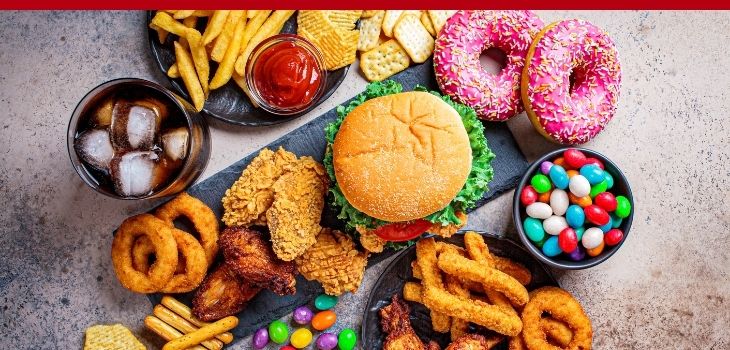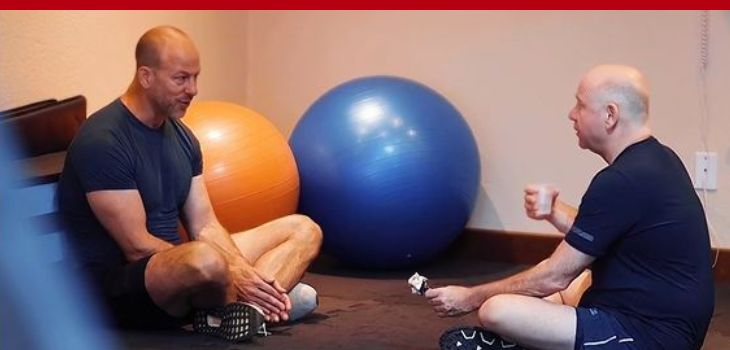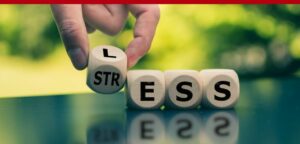by Ted Ryce
Ted Talk 121: Help! I Can’t Stop Stress Eating!
by Ted Ryce
by Ted Ryce
Ted Talk 121: Help! I Can’t Stop Stress Eating!
Ted Talk 121: Help! I Can’t Stop Stress Eating!
more
by Ted Ryce
Ted Talk 121: Help! I Can’t Stop Stress Eating!
We must eat to survive. But most people, when they’re under a lot of stress, eat to ease emotions.
Even if their problem has nothing to do with food, the truth is that you are not hungry; you are just feeling overwhelmed.
You feel bad; give in to temptation. You feel guilty, and you experience more stress, you eat more. And the cycle never ends.
In this Ted Talk episode, Ted explains how to break out of the stress-eating cycle. Plus, practical strategies to help you lower your stress levels and finally stop reaching for the cookie jar whenever you feel stressed.
You’ll learn:
- The link between stress and food cravings
- Relationship problems and stress eating
- Ted’s personal struggles with emotional eating
- How to fight against stress eating:
- Step #1: Awareness
- Step #2: What are your triggers?
- Step #3: Copying strategies
- Step #4: How to take action
- Effective methods to lower your stress levels
- And much more…
Links Mentioned:
Join the “FIT TO LEAD” Facebook Group Now!
legendarylifeprogram.com/apply
Related Episodes:
RTF 99: Help! I Can’t Stop Emotional Eating!
455: How Your Brain Is Making You Fat (And What To Do About It) with Stephan Guyenet
480: How To Become Stress-Proof: The Secret To A Stress-Free Life with Dr. Mithu Storoni, MD, PhD
Do You Need Help Creating A Lean Energetic Body And Still Enjoy Life?
We help busy entrepreneurs, executives, and other high-performers burn fat, look and feel younger while enjoying the lifestyle they worked hard to create.
If you’re ready to boost your energy, have the body you deserve, and say goodbye to time-consuming workouts and crazy diets, we’re ready to help.
1) Want to learn the simple 5-step process my high achieving clients over 40 are using to skyrocket their energy and build younger leaner bodies while enjoying life? Watch my brand new Masterclass.
2) Join my Exclusively Facebook Group for CEOs, executives, entrepreneurs, business owners and other high performers who are looking to lose 15-30 lbs of fat and transform their bodies without giving up their favorite foods or social life in the process. Join the “FIT TO LEAD” Facebook Group Now!
3) Work with my team and me directly in the Legendary Life Program and get started reclaiming your health and creating the body you’ve always wanted right away. Marvel at the testimonials here first, then schedule your call.
4) Click Here To Schedule a Breakthrough Call with us today!
Podcast Transcription: Help! I Can’t Stop Stress Eating!
Ted Ryce: Today we’re going to talk about the number one struggle that my entrepreneur clients have shared with me. I’m going to talk about their number one struggle. And I want to ask you, what do you think that is? Well, if you said stress eating, then you’re right. You’re correct. That is the number one thing that executives, entrepreneurs and other high performers struggle with.
The stress comes on, triggers cravings, they end up eating, the eating kind of helps them feel better. But the side effect of that is the pound start to pile on. So, if you’re wanting to understand my method for conquering stress eating, I’m going to share it with you today.
What is up, my friend? Welcome back to the show. I’m your host, Ted Ryce, coach to entrepreneurs and other high-performing professionals. And I want to tell you, this is not just an entrepreneur executive problem, obviously, it’s a problem so many people struggle with. And it’s a problem that I’ve struggled with.
Now, I’ve been working for myself since I was 22. I was an entrepreneur, but didn’t really know I was an entrepreneur, I was a solopreneur. But then someone told me one day, man, you got to get your act together.
So anyway, my point is I used to stress eat, and also it took me a long time to figure out I was doing it because the issue was that I was always thin, I was always lean. In my teens, I was super lean, you could always see my abs. My problem was putting on weight. But I was stress eating as a kid, I would binge eat all the time, I’d just burned it off.
And as I got in my 20s, everyone thought I was so healthy, because I was lean, I was even in better shape. My muscles were bigger, but I was still stress eating. And in my 30s... Well, not only was I stress eating in my 20s, I was stress smoking marijuana. And I was stress drinking. And in my 30s, I kind of gave up the weed, but oh, alcohol, more socially acceptable, did plenty of that in my 30s, at least up in my early to mid-30s.
And I didn’t realize what I was doing. It took me until my 40s actually, or my late 30s really, and then in my 40s where I remember the first time that I could have some sweets in the refrigerator or freezer and not have them like call to me.
I would be sitting there in my house, and I’m just, “I know the sweets are in the refrigerator. I know the ice cream is in the freezer and I can’t help myself.” I try to say no, I try to say no, and maybe I’m successful. But eventually I’m going to give in and eat whatever’s in there.
And I remember when Gisele and I split up, my ex-wife, when we realized that we were more business soulmates and not soulmates in the way that we would be together and in marriage. And I remember when we first split up, I was heartbroken and she was crying, I was crying, we still knew we were going to work together. We had a dream of this business together.
This business has given us so much joy and freedom and really saved our lives, but that part needed to end. And when it did, it hurt so bad, but a few weeks later, for me, because Gisele doesn’t really have the stress eating problem. She has other stress problems, but stress eating, she’s always maintained a good body size, always. But for me, I remember a few weeks into it, I started to get past the sadness of breaking up and divorcing, really.
And I was in therapy and I started to see the way out. I started to see the opportunities instead of the loss. I was making that shift. If you’ve been divorced, you know what I’m talking about. You’re like, “Everything’s over, my life is over. I’m divorce. Oh, nobody’s ever going to love me or want to be in a relationship with me again. I’m old.” Gisele and I were together for seven years. And I started to move into, ‘Oh, people, but women still do find me attractive. Women that I find attractive, still find me attractive,” and “oh, I have all these qualities.”
And I started to realize that, I started to feel better. I started getting leaner. In fact, I got into the best shape of my life up until that point in 2019 in Bangkok, Thailand. And I remember I had gone food shopping at the Tesco Lotus that was a few blocks down from the condominium complex I was staying in, and on the way out of the Tesco Lotus, there’s this Hokkaido cheese tart place—and they’re delicious.
I don’t know if you’ve ever had the Hokkaido cheese tarts in Thailand, they’re just crazy for Japanese ice cream and sweets and with good reason because they’re delicious. Some of the best ice cream and sweets that I’ve had have been in Thailand, but they were Japanese. So, I picked up six, because it was buy five and get the sixth one free. I took them back to my house, I ate a couple, or maybe half, and I left the others.
And I’m like, “Wow, I don’t recall the last time I’ve ever been able to do that.” And that got me thinking like, what happened?
I felt like a drug addict for most of my life, when I had cookie dough ice cream in the refrigerator, in the freezer. And that’s what I want to talk about today. So, if you resonate with any of that, let’s jump in.
The first thing is being able to distinguish between physical hunger and emotional hunger or stress-induced craving. So, physical hunger comes on gradually; you feel it in your stomach, you start to release this hormone called ghrelin and you [stomach growling] you know, you’ve had your stomach grumbles before. It’s caused by ghrelin, by the way, that hunger.
And any food will do. I mean, if someone gives you a few slices of pizza, or burger, and sweet potato fries, or whatever, but you’re hungry, you would also eat the healthiest valuated chicken salad with dressing on this side, you don’t care. Just give me something, I just need to eat.
And it’s easy to satisfy, when you have enough food, no matter what type of food it is, you feel fulfilled, you feel satiated, but stress-induced cravings hit suddenly. And it’s a mental craving, and it’s usually a specific food, and it’s very hard to satisfy.
In fact, I remember, I don’t even remember exactly what it was that triggered me. But I remember I was already full, then something happened. And I was like, “I need to eat something. I need something now.” And it wasn’t baby carrots, organic baby carrots, I needed some sugar.
And really, when we say that, it’s just a more fun way of saying hyper palatable foods. So, cookies, something with sugar and something with fat, highly processed and hmm, that mouthfeel just makes my brain go, “This is pleasure.” That’s a stress induced craving.
I don’t remember if it was a fight with someone or I just gotten some bad news, I forget what it was, but I needed some ice cream.
So next time you have this...So devel oping awareness here is key; you need to be able to distinguish between physical hunger and emotional hunger or stress-induced cravings. And again, there’s these very easy distinctions. So the next time you feel this, ask yourself, is this physical hunger? Or is this one of those cravings?
I remember, I’ve been in—and I know you can relate to this. I’ve been full. And I’m like, “I know I need something sweet.” And then you eat something sweet. And you’re like, “No, I just need a little bit more of something sweet.”
And then you have a little bit more and your stomach is starting to hurt. But yet you’re still spoon feeding yourself, you know, in my case, ice cream. It’s my go-to. It’s my drug of choice. It’s the responsible person’s drug of choice, right?
I remember my client, Sarah, who lost 100 pounds in a year. She’s like, “Look, I’m the Christian Mom, I’m never going to be doing meth off the toilet seat, okay, never going to happen, but I’ll get into some chocolate cake. So, being aware, is it physical hunger, is it emotional hunger?
And the second thing is you need to identify the trigger. What is triggering you? Is it something specific? I’ve talked a lot about the craziness of my life. But I want you to think about, well, the craziness of your life. I remember a client telling me, “Hey, I’m good. From the morning, I feel amazing. But after a day of running my business, 5pm comes around, time for a steak, time for a few glasses of wine, and maybe some chocolate lava cake for dessert.”
Once the floodgates are open, just keep going, right? Especially if alcohol is involved, lowers your inhibitions.
I had another client running a successful company. He felt bad that he was feeling stressed from being so successful, so it doesn’t need to be like a bad thing or I’m going through divorce. It doesn’t need to be that. It could be from a good situation.
It’s just too much of a good thing becomes stressful, just like exercise. You can lift weights, but imagine lifting weights every hour on the hour for 30 minutes, 24 hours all day long.
That’s going to get a bit old, you’re going to feel, “Oh my I feel terrible.” A good thing could turn into a bad thing if it’s too much. The key is recovery.
So again, identify your trigger, identify your trigger.
And then the third thing we need to do is evaluate our coping strategies. We have two ways of coping, we have emotional coping, and then we have problem-solving coping, for example, eating.
I mean, let’s go with obvious example here; eating food doesn’t solve any problem. The only thing that eating food does, in terms of solving problems is if you have physical hunger.
If you’re really hungry, you need to eat, because for those of you who’ve done intermittent fasting, especially, you know, stress levels go up when you’re hungry, you can’t think straight, food solves that problem. But if you’ve got a problem in your marriage, I remember talking to a client, she’s like, “I’m eating…” and I’m asking her, “Well, why are you eating so much during the day?”
And then after further questioning her, it was a situation with her husband, and I’m not going to divulge the personal details, because I want you to take this and apply it to yourself, because food won’t fix a problem with your husband, food won’t fix the problem that you hate your job. Food won’t fix the problem that you’re single after a divorce and lonely. And I want to talk about this again, emotional based coping, and problem-solving coping.
So obviously, eating food is you’re trying to shift your emotional state. But it doesn’t really help you.
Actually, I want to take that back. There are some studies showing that it does cause a change in the brain and lowering of stress levels. I believe this study was done on ice cream. So, it actually does help you. But it’s momentarily, it helps you momentarily, and it has a side effect of making you fat.
We could also use exercise; exercise doesn’t fix the problem in your marriage, it doesn’t fix the problem in your business, either, but it shifts your emotional state.
Now I want to say this too; I think a good time to talk about this. We need both. We need to manage our emotional state through the experiences or challenges that we have. And we also need to solve the deeper problem.
The issue is most of us, what we do is we never address the problem directly until it gets really, really bad. And we mostly use emotional coping. And we mostly use ways of coping that have side effects, we use alcohol, and we use food. And some of us who are more unconventional, a little bit more rebellious use things like other drugs.
I should also say this too. Actually, I went from one extreme to another. So, I was high all the time in my 20s—don’t want to go off on a tangent of why that was. But if you know my story, you can put two and two together pretty easily. But I remember when I switched gears and I went from being stoned all the time to going to Jiu-jitsu all the time.
And I want to say this too, because I think it’s important because I know there’s someone right now that’s going to relate to this. I ended up changing one extreme thing for another extreme thing.
And what was that extreme thing? In my case, it was Brazilian Jiu-jitsu. Oh, what’s wrong with that? Well, my knee cartilage in both knees, especially in my left knee, and the herniated discs in my neck. Although that was partially from a car accident as well.
So even if you’re using a “healthy way:” of coping with emotions, like exercise, it can become negative.
And I want to say this too. I think it’s another important nuance here. Every once in a while, if you stress eat, it’s not the end of the world. It’s just that we preferentially and excessively medicate ourselves with food and drugs. And we typically don’t deal with the deeper issue—some of us probably.
I mean, this podcast is for high performers, but people who are off in lala land, listening to music all the time, and just really unaware, they probably never deal with the deeper problems in their life.
And probably did, and doesn’t potentially hit them until they’re on their deathbed, but you’re not one of those people, you’re here. But even us, we don’t deal with the deeper problems.
So how are you handling your stress? What are the things that you’re doing? And I want to share with you some of the things that I switched to. How did I become emotionally healthier in dealing with my stress? So, one of the things I started doing, I started getting massages, I started getting acupuncture, I started doing meditation, I meditate almost every day. And when I’m feeling stressed, I meditate more.
For most people, when they’re feeling stressed, most Americans at least, they exercise less, anything good, they drop, and they just eat and watch TV and drink.
So, that is what we need to be aware of here—evaluate our coping strategies. How much of the emotional coping am I doing? How much of the problem-solving am I doing? And how healthy is my emotional coping?
Am I running to the easy things that shift my emotional state like ice cream and alcohol? Or do you have a more of a variety? And this was a bit of a tough one. And I want to tell you, I’ve been in America—welcome to America!
I’ve been in America for a couple months now. It’s the longest time I’ve been in America in the past three years, and the culture here dealing with stress sucks. It’s no wonder everyone is so stressed the fuck out here.
In Thailand, there’s a massage parlor on every corner—and no, not that type of massage parlor. Get your mind out of the gutter. Real massage parlors, real massage places, they do all manner of things. And yes, still get your mind out of the gutter because I’m talking about they do foot massages, they do deep tissue massages, they do Thai massages, they do oil massages, they do facials, they do all these different things.
More recently in Mexico, I was getting a massage weekly. Actually, I was getting like two or three massages weekly as often as I felt I needed it because I was feeling quite stressed there. And I would also have friends that I would meet and go to the spa at the Hyatt there and we jump in the sauna, we jump in the jacuzzi and we jump in the cold plunge pool.
I’m going to be heading back to Brazil, I’ve got an acupuncturist there. I’ve got a massage therapist there, I’ve got friends that I’m going to go and hang out with and do fun things like drive go karts, they’ve got professional go karts there. So that’s what I do.
And here in Orlando, actually they’re great massage people here, they’re a little hard to find and it’s a bit more expensive. But I’ve been going to the parks and having these amazing times riding the roller coasters and just being immersed in this magical environment of a theme park.
Now, you may hate theme parks, and you may not like massages, but the point is this, you need to adopt some things to experiment with some things so that you can lower your stress on demand without alcohol or food. You may hate meditation. In fact, I had a conversation with a client recently, he said something kind of funny. Glenn, if you’re listening, shout out to you. He said, “Well, someone told me...”
He was telling me about a story of when he was talking about how he stress eats. He runs a company and he was talking about stress eating, he was talking about how he shared it with someone. And then they’re like, “Oh, why don’t you just go for a run?” That’s stupid advice. “Everybody, especially if they’re running a company, they’re smart enough to know that going for a run is better than shoving food in their face.”
And he kind of said, “Yeah, I kind of felt like telling that person to shove the run up his ass.” And I said, “Yeah, and you should, because it’s stupid advice. But here’s what I want to ask you, Glenn, what is the thing that you feel like, would be great for you?” And then he started talking about doing some recording and playing around with some music recording software.
I don’t play music anymore, but I remember when I used to - story for another time, folks, ’ll even share some of my music that are recorded in the band. I think you’d be surprised. I’ll slap it on the end of an episode one time. But I remember when I used to play, I used to be very stressed. And then I would play my bass and 5 or 10 minutes later, I was just like, “Wow, how incredible do I feel right now.” I said, “You should totally go do that.”
Because here’s the thing. You don’t need as much exercise as you think, compared to controlling the stress eating if you want to lose fat, because it’s so hard to burn calories with exercise and it’s so easy, or much easier, rather. It’s not that easy, but we’ll talk about that in a second. But once you manage your emotions, it’s so much easier to not eat the 300 or 500 calories that you’ll have to burn off later with exercise because you can do 30 minutes of running.
Gosh, most people hate running, I do. And then all the way out, you grab yourself a Snickers and a Gatorade and guess what? You just ate back your calories. You net zero. Now you’re in better shape, you’re in better cardiovascular shape, but fat loss? No. No.
So, what is that thing that you could try as an alternative? And then after that, you need to create the plan, you need to schedule the activities.
So, we’ve talked about distinguishing between physiological hunger and stress-induced cravings. We talked about identifying the triggers. We talked about evaluating your coping strategies, how much emotional Coping are you doing? Are you doing any problem-solving?
And then we need to figure out what are the things that we can try that are different than shoving food in our face and throwing back an IPA or a few glasses of wine? What are those strategies? And they’re different for everyone.
And then we need to schedule them, we need to take action. And that’s what I get my clients to do, and it works, provided that you take action. And I want to tell you something, you might say, “Well, I don’t want to do anything, I don’t have anything.” Well, then if you don’t have anything different, then you need to go experiment.
Gosh, don’t be a baby, go experiment. You’re going to feel so much better in your life when you go try new things. You may not like them, you may try meditation and go, “Hmm, not a fan.”Okay, cool.
What are you a fan of? Maybe it’s dancing. Maybe it’s playing a musical instrument. I had someone tell me recently—she’s not a client, but she’s referred client, actually, and she’s in my Facebook group. Shout out to you, Melanie. And she said that she likes to do things with other people. She’s like, “It’s not as important what I do, but it needs to be done with other people.”
So, what can you do? What’s something you can experiment with? Or what is that thing that you know, works for you, but you just haven’t been doing it, and go do that. And it’s as simple as that. It’s as simple and as hard as that. I want to tell you, if you resonated with this, and you feel like you need some help, you need some accountability, you need someone to guide you through this process, because holding yourself accountable isn’t working and the other people in your life, you love them, they’re supportive, but they can’t support you in this way to get the job done. And you need someone to do that, then you and I should talk.
And if that’s the case, go to legendarylifeprogram.com/apply. What is that for? That’s for a 15-minute call for you and I to hop on, talk for a bit about what’s going on to dive a bit deeper, and for you to come up with a strategy. And if it feels like a good fit for you, and you feel like a good fit for what I do, I might invite you to be part of the coaching group, but it’s a free 15-minute call, legendarylifeprogram.com/apply.
Who should apply for this? Well, I work with executives, entrepreneurs and high-performers. If that’s you, and you have received coaching in the past, and you know the power of coaching, and you’re an action taker, let’s do it.
This is for you. If you’re someone who’s wishy washy, if you’re someone who really doesn’t have it together, maybe you should be listening to another podcast even, because health and fitness isn’t your major problem, Maybe it’s more financial, then that’s not the call that you should make.
But again, if you’re an executive and entrepreneur, if you’re looking to get this handled, you need help, even though it’s hard for you to admit that you need help. I’ve been working with entrepreneurs and executives for 23 years, let’s hop on a 15-minute call to see if I can help you.
All right, that is it for today. And I want to ask you, what is the big thing that you can take from this podcast and go implement? Because I don’t want you to...Look, even if you’re binge listening to the podcast, it’s cool. I get it. Take notes, though. What is something that you can take action on and go and do? Don’t just binge listen. That’s the problem; we all get high off the information, the dopamine flows when we learn new things. But if we never implement what we learn, our lives don’t change.
So go change your life. Remember, learning is learning and applying, learning and applying. It’s not just learning, learning, learning, learning, learning, learning. Well, I would apply but I just need to learn a little bit more, so learn, learn, learn, learn. That’s not learning; learn, apply, learn apply. So go and conquer stress eating, have an amazing weekend, and I’ll speak to you on Monday
Sign up to receive email updates
Enter your name and email address below and I'll send you periodic updates about the podcast.









